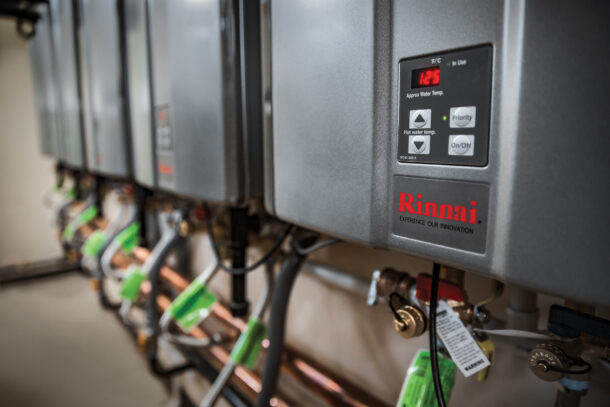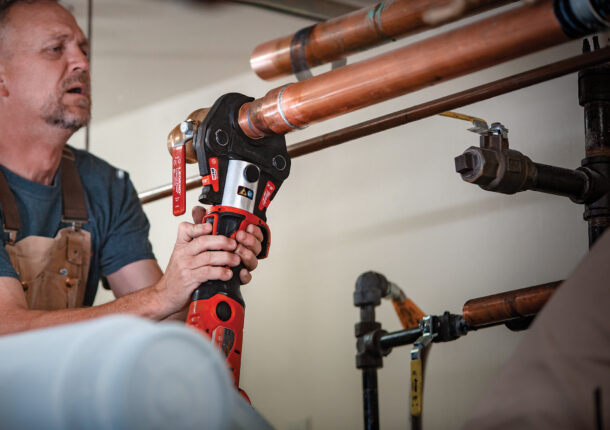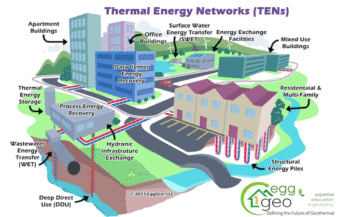Propane provides a versatile, efficient water heating solution for any size building
Water heating can account for up to a quarter of all energy use in some commercial buildings. And because nearly 80 percent of water heating energy use occurs in buildings built before 2000, replacing outdated systems with newer, high-efficiency water heating technology can offer significant improvements in terms of performance and savings.
Water heating systems can be powered by a variety of energy sources, but many contractors are finding high-efficiency propane tankless water heaters to be the best solution. These compact water heaters provide a versatile, sustainable, and energy-efficient solution for many commercial applications.
Tankless propane water heaters only heat water when it’s needed, making a storage tank unnecessary and eliminating standby losses associated with maintaining a tank of hot water. Thanks to their compact, space-saving design, tankless units free up valuable square footage in commercial buildings and cramped mechanical rooms. Because they don’t require a bulky storage tank, units can be wall-mounted, free-standing, or even moved outside. Plus, tankless units are less labor-intensive to install than tank-style units or boilers.
As contractors seek the best water heating solution for their commercial customers, here are three key advantages of propane systems they should know:

-
Propane tankless water heaters can meet the needs of any commercial building.
Propane tankless water heaters offer a versatile, high-performance water heating solution—whether in a new project, as a replacement for an existing storage tank, or a boiler system.
One of the biggest benefits of this tankless technology in commercial applications is its flexibility to meet a wide range of load types. Propane systems can provide water heating for a variety of commercial applications including restaurants, multifamily residences, hospitals, laundromats, salons, health clubs, educational facilities, and hotels. Individual tankless units can meet the demand of many small commercial building applications and in high-demand commercial applications—such as hotels and restaurants where users need high flow rates, high temperatures, or both. Multiple units can be banked together in larger groups to provide a high-value design solution or even use a single unit with multiple heat exchangers delivering up to 3 million BTU/hr.
Most importantly, propane is a winning solution in buildings without access to natural gas—which is especially beneficial for resorts and lodging facilities that are oftentimes located well off the natural gas line.
-
Propane water heating offer significant cost savings and superior energy efficiency.
The occupancy and use of many commercial buildings may change over time, but energy efficiency and cost savings will remain key considerations. Propane water heating technology offers a long lifespan, competitive operational costs, and a lower total cost of ownership compared with other options.
The trend toward energy efficiency and zero net energy buildings isn’t slowing down. Now more than ever, commercial building owners are emphasizing energy efficiency, and they’re seeking products and designs that will support their efforts.
One of the most important benefits propane tankless units offer building owners and operators is energy-efficient operation and subsequent cost savings. Propane tankless units have efficiency ratings of up to 98 percent, these systems feature a condensing design that extracts additional thermal energy from combustion gases to heat incoming water.
Commercial operations have experienced significant cost savings after switching to propane. Notably, a Nebraska brewery, Bolo Beer Company, decreased its operating costs by more than 25 percent by using propane water heaters instead of electric water heaters. Ruby’s Inn, a resort in Utah’s Bryce Canyon National Park, is saving approximately $6,000 a month installing a system of propane tankless water heaters.
Beyond their noteworthy efficiency ratings, propane tankless systems can function for up to 20 years or more strengthening their value proposition in commercial applications. High-efficiency propane tankless water heaters also offer attractive paybacks, better reliability, and long-term energy savings—all helping offset higher initial capital costs. And planning your retrofit away from electric water heating to propane tankless water heating can save all the costs associated with emergency replacements and damage that can occur when storage tanks fail.

-
Propane tankless units help reduce a building’s carbon footprint.
In addition to decreasing energy consumption and costs, propane systems can make buildings more sustainable. According to data from the Propane Education & Research Council (PERC), propane tankless water heaters produce up to 47 percent fewer nitrogen oxide (NOx) emissions, 61 percent fewer greenhouse gas emissions, and 91 percent fewer sulfur oxide (SOx) emissions than electric storage tank water heaters powered by grid supplied electricity.
Switching from an electric storage tank water heater to a propane tankless water heater can prevent more than one ton of greenhouse gas emissions from entering the atmosphere each year—the same amount produced from driving a car more than 3,000 miles.
Water heating continues to be a major energy consumer in commercial buildings. Whether seeking increased energy efficiency, better performance, or a smaller carbon footprint, building owners can rely on propane to deliver a sustainable water heating solution in any size building.
To learn more about the benefits of commercial tankless systems, visit Propane.com/Water-Heating.
 Bryan Cordill is the director of residential and commercial business development at the Propane Education & Research Council. He can be reached at bryan.cordill@propane.com.
Bryan Cordill is the director of residential and commercial business development at the Propane Education & Research Council. He can be reached at bryan.cordill@propane.com.




Join the conversation: